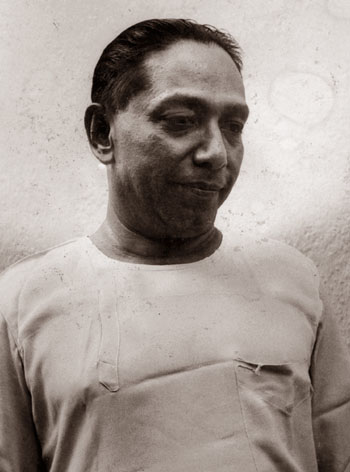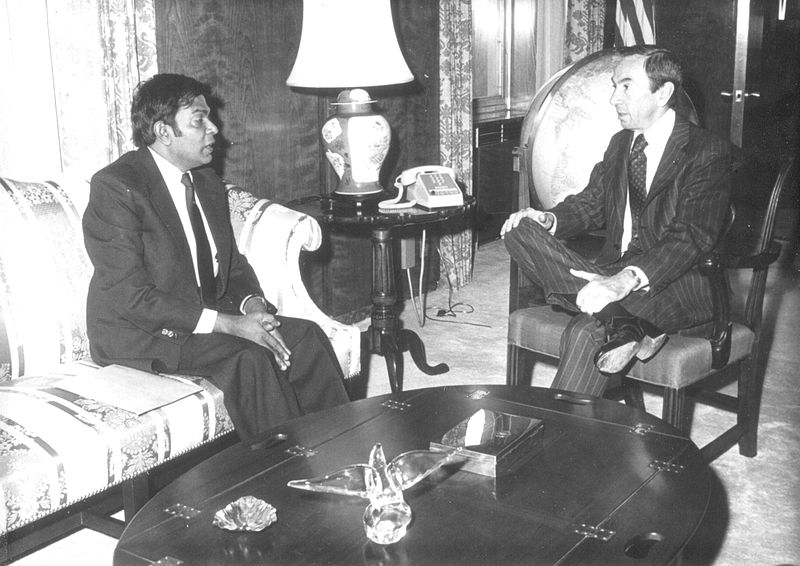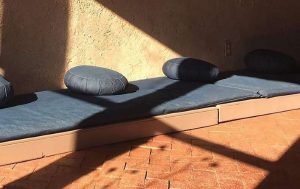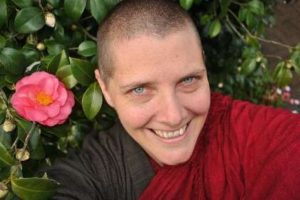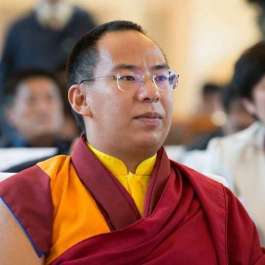
At 81 and having endured cataract surgery in Colombo last September, one could be forgiven for thinking that Yakupitiyage Karunadasa, known affectionately to his students as Professor K, wouldn’t have been keen to teach at the Buddha Dharma Centre in Hong Kong’s Wan Chai district. However, while he admits to feeling a bit tired, he has nothing but praise for his time at this academic institute, where he has been teaching early Buddhism and Abhidhamma since May (he will finish his course and return to Sri Lanka in July).
“Even now, I enjoy teaching. Teaching gives me a sense of self-fulfillment,” he told me when we met at the center on a sweltering June afternoon. His diminutive, fragile frame houses an extremely formidable mind and an enthusiastic devotion to Buddhism. During our conversation, I invited him to reflect on his pedagogy and intellectual life, which in turn have helped his students grow into more mature, thoughtful people.
His career is familiar to students in Sri Lanka and elsewhere: he earned his BA from the University of Ceylon in 1958 and a PhD from the School of Oriental and African Studies (SOAS) in London in 1963. Over the course of several decades, he proceeded to build his name on a string of publications and professorships, including over a decade spent at the Centre of Buddhist Studies at The University of Hong Kong. Moreover, in 2005, he was accorded the honorary title Sri Lanka Sikhamani by the Sri Lankan government for his general service to the nation.
The origins of this long journey lie in a more or less accidental encounter. “I didn’t have a real plan to study Buddhism in the 1950s. I lived on the University of Ceylon’s residential campus and there was a famous professor called Gunapala Piyasena Malalasekera [1899–1973],” he recalled fondly. “He was a teacher of Pali and the founder of the World Fellowship of Buddhists. He later became the ambassador to the Soviet Union and worked at the UN. He also happened to be my dorm warden!” he laughed. “He never asked me or convinced me to study Pali. His very presence motivated me to find out more about what he was teaching.” The young academic struck up a friendship with the scholar-diplomat, and looking back, attributes his initial interest in Buddhist Studies to the inspiration he found in Malalasekera’s personality.
“In those days, Buddhist Studies was called Indo-Aryan Studies. It was a broad field, but mainly focused on the study of the suttas, Abhidhamma, and Pali. We did some elements of Mahayana Buddhism. I had a Chinese professor, Wang Pachow, who taught me Mahayana. I came to see Mahayana not as a historical development of Theravada, but as its doctrinal enlargement. You find many non-historical Buddhas in Mahayana, and that is good! What matters is not their historicity nor Shakyamuni Buddha’s, but what they teach.”
Prof. Karunadasa attributes his inspiration to pursue Abhidhamma studies to the charismatic intellectual and politician Wijesinghe Sugathadasa Karunaratne (1928–1986), who at the time had been giving lectures about the analysis of matter at the University of Ceylon (he became a full professor of Buddhist philosophy at the university in 1964). The analysis of matter would later become the subject of Prof. Karunadasa’s doctoral thesis. He speaks happily of his three years studying on a scholarship at SOAS. “When I was there the British method of teaching PhD students had no coursework. You had to write a very good synopsis or abstract, and if it was accepted, you proceeded to do your research immediately. My own teachers, like Prof. Karunaratne, did their PhDs at SOAS too.”
After his PhD, he transitioned from being a student learning under celebrated names to becoming a professor himself, cultivating a teaching style that was secular and fair-minded. He laughs when I ask him if he remembers any of his happiest moments in teaching. “When I teach students who don’t know about Buddhist Studies at all, I feel happier than teaching those who have already been exposed to Buddhist Studies. It’s more adventurous. For those already exposed to the subject, it’s not so fascinating. In a way, it’s easier because they carry no prejudices.”
Prof. Karunadasa’s teaching style stays faithful to the traditional goals of a liberal arts education, regardless of social changes or economic shifts (which have led to extensive cuts in the budgets of humanities faculties across the West). “When it comes to academic Buddhist Studies, we don’t train you to become a better Buddhist. Buddhist Studies shouldn’t have a religious agenda, nor is it a profession-oriented course. It is intended to expand your intellectual horizons and deepen your critical faculties,” he said. “We follow a middle way between apologetics [intellectually defending the validity of one’s faith] and polemics [mounting philosophical attacks on other traditions]. We avoid these extremes.” He believes that this methodology has allowed people from other religious traditions to feel comfortable studying Buddhism.
“At the turn of the 19th century, scholars began comparing the scriptures of the Three Vehicles of Theravada, Mahayana, and Vajrayana. Hence began the age of historical, comparative, and critical studies in Buddhist texts. My job today is to clarify things, not justify them. My only purpose is to communicate as accurately as possible what I find in the original Pali texts. I present what I find, but whether one decides to accept it is an individual matter.” There was, of course, the challenge of scholarly bias and the sin of pretense to objectivity, but with a twinkle in his eye, Prof. Karunadasa dismissed this as an inevitable shortcoming of human nature. “As long as we are in samsara and not arhats, we look at things from an egocentric perspective—my view, my thesis, my opinion . . .”
Prof. Karunadasa is largely optimistic about the future of Buddhist Studies. “There are many students, but unfortunately we don’t have enough teachers,” he complained. While funding in Europe is scarce, he foresees more activity in the United States (mainly thanks to private philanthropists and donors), paying particular tribute to Master Hsing Yun’s University of the West in Rosemead, California. He is also hopeful of developments in Australia thanks to the efforts of a generation of well-educated monastics. Many of these monks and nuns have applied rigorous exegesis of the Vinaya to argue for the ordination of Theravada bhikkhunis.
“It [women’s ordination] is the greatest blessing,” laughed Prof. Karunadasa endearingly. “I like it very much. I am for that! Thailand is very strict, so strict. But Sri Lanka is more liberal. We have many women ordaining now. One of my PhD students ordained as a nun. I saw her when I was last in Sri Lanka.” He also believes that China will be the epicenter of the ongoing Buddhist reawakening and renaissance. “I don’t believe India can do this,” he said, shaking his head. “Hinduism is too entrenched and Buddhism will not be able to gain ground there.”
Understanding the purpose, effectiveness, and relevance of the Three Vehicles in this changing world is perhaps the greatest philosophical challenge facing the global Buddhist community today. Buddhist Studies has become an integral companion to this challenge thanks to its multidisciplinary, critical approach. Prof. Karunadasa has overseen several generations of Buddhist scholarship during his working life, and one might assume that his part has been played. But in reality, as Buddhism and Buddhist Studies confront new challenges together, experience and wisdom of his caliber are needed more than ever before.




